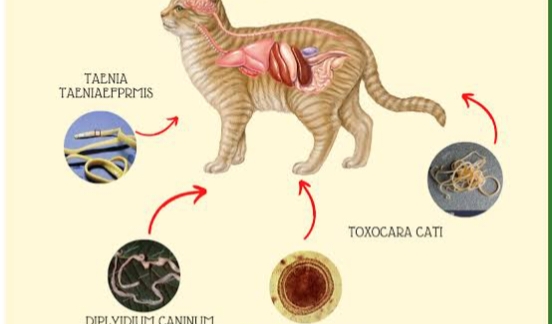What Are Cat Worms? – Cat worms are intestinal parasites that can be found living in your pet’s digestive tract, attaching themselves to the linings of the stomach and small intestines and robbing your pet of vital nutrition.
Cats that are infested with worms generally become quite scruffy looking, and the abdomen takes on a pot-bellied appearance. If the condition is allowed to continue unchecked, an affected cat’s immune system becomes compromised, making it difficult to fight off other illnesses, and the animal’s health quickly declines.
Also read: Feline Hair Loss
Kittens are especially at risk for contracting worms. Roundworms may be passed to kittens while nursing from their mother, but worm ova can also be found in soil and other sources. Being naturally curious about their new world, kittens tend to try out everything with their mouths, ingesting ova along the way.
Typical Types of Cat Worms Include:
- Tapeworms – These cat worms are rather flat in appearance and can range in size from less than an inch up to about two and a half yards.
- Roundworms – These intestinal parasites resemble a piece of spaghetti and are the most common type of worms found in pets.
- Hookworms – These worms are named for the hook-like teeth they use to attach themselves to your cat’s intestinal walls. These parasites feed on blood causing diarrhea and anemia.
How Do Cats Get Worms?
- Cats and kittens may contract worms in several ways.
- Ingestion of soil and plant material contaminated with worm ova
- Exposure to feces containing worm ova
- Ingesting fleas that harbor worm ova
- Nursing from a contaminated mother
- Eating contaminated prey such as mice and birds
It may also interest and alarm you to know that humans can ingest worm ova shed by their cats, although the parasites are unable to complete their life cycle within their human hosts. This is one good reason to keep Kitty off your tables and countertops!
Diagnosis and Treatment
Diagnosis of cat worms requires an examination of a fresh stool sample from your pet. Your veterinarian will use a centrifuge to separate worm particles from the stool, and then identify the type of worms present, if any, with the use of a microscope.
Once the type of worm is identified, your cat will be given deworming medicine developed to be effective for that particular type of worm or worms. And yes, cats may carry more than one type of worm at the same time, so a proper diagnosis is essential for ridding your pet of these parasites.
Also read: 8 Reasons Why Cats Don’t Want to Eat and How to Overcome them
It should be noted that if you have multiple cats, they will all likely be infected with these parasites at the same time, especially if they are using the same litter box. Therefore, it’s necessary to provide a stool sample from each one, and simultaneously treat everyone for any infestation present.
Prevention
Worm infestations are extremely common and difficult to prevent, but there are some measures you can take to cut down on your pet’s possibility of worm exposure.
- Limit your cat’s outside exposure to soil and plants.
- Do not allow your cat to eat or play with birds and mice.
- Keep your cat from associating with neighborhood strays who may already be infested.
- Keep your cat well-groomed, reducing the chance of flea infestation.
Conclusion
Cat worms are more than just mere pests. They can have a grave effect on your pet’s health.
To keep your cat as safe as possible, be sure to bring your pet to your vet for an annual examination, and provide a fecal sample every six months. This routine health care can make all the difference in your cat’s quality of life.

